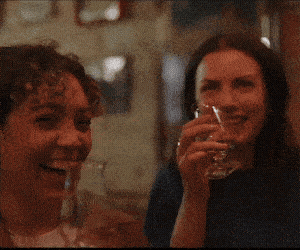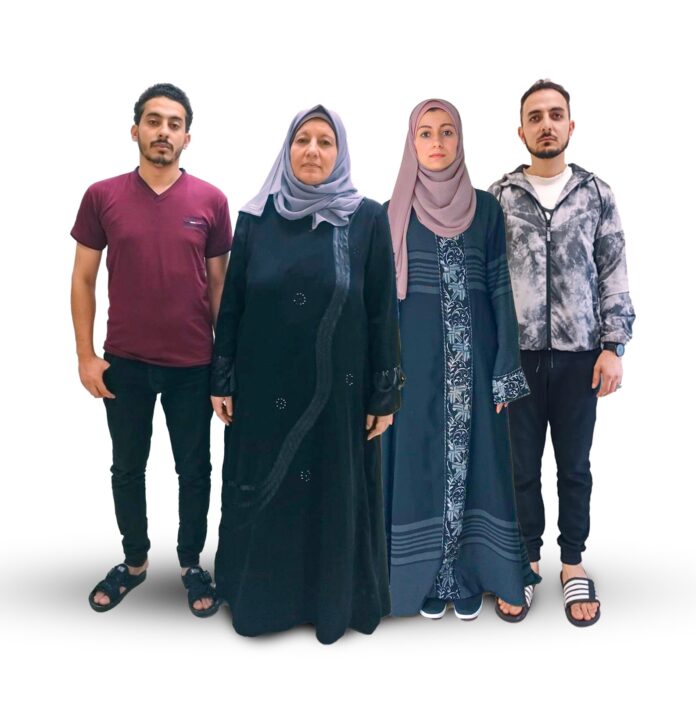
Limerick Post reporter Alan Jacques spoke to Waleed Maza, a young man from Gaza currently seeking asylum in Knockalisheen, who wants nothing more than to be safely reunited with what little is left of his family, and has begun a fundraising campaign to help make that happen. According to the United Nations, over 25,000 Palestinians — 75 per cent of them women and children — have been killed in the ongoing conflict in Palestine at the time of going to print.
HOPE, South African Bishop Desmond Tutu once said, is being able to see that there is a light despite all of the darkness.
Palestinian refugee Waleed Maza, who has called Knockalisheen Accommodation Centre in Meelick, County Clare, home for the past three years, is definitely a man who knows all about keeping hope alive.
Despite overwhelming concern for his family in Gaza, Waleed is very much focused on the future, and on building a better life for all of them. A gentle soul with a warm smile, he puts a brave face on things but is visibly struggling to cope with the hellish reality his loved ones now find themselves faced with as we sit down to talk.
Since October 7 last, 28-year-old Waleed’s whole world has been turned upside down. And with over 25,000 Palestinians killed since the war in Gaza broke out five months ago after the Hamas attack on Israel, there is no escaping heartbreak in his native homeland and the grief that has come to knock on the door of so many families.
Waleed’s father Zuhair (65), his two younger siblings, brother Ali (5) and sister Sham (3), and his grandmother Shamaa (76) were all killed in a bomb blast as they slept in their beds last November. His mother Ibtisam (55) and brother Aaed (26) were lucky to escape with their lives after being pulled from the rubble in another attack around the same time.
Waleed also lost his cousin Omer (33) and Omer’s wife Najwa (30), as well as their two young children. His cousin Emad (29) has also been killed by Israeli missiles alongside his wife Khadija (25) and their newborn baby.
“I never saw my cousins’ children and my sister Sham because I am unable to go back to Gaza. The internet connection before the war was very bad, so I always contact my family over the phone,” a brokenhearted Waleed explains.
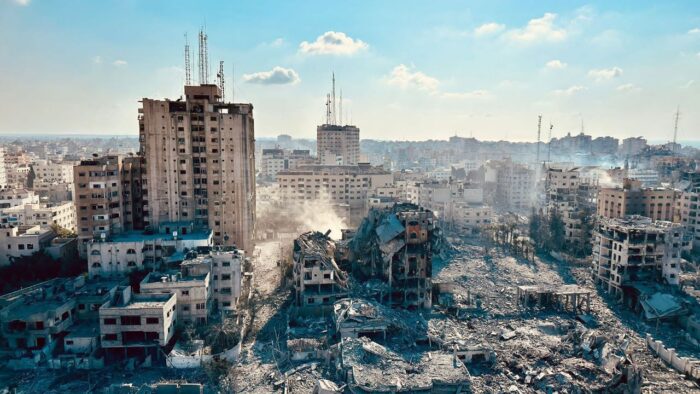
‘All killed while they were sleeping’
The scenes in Gaza bring new challenges for its inhabitants with further bombardments and soaring deaths every day.
Now, on top of the relentless onslaught of fatalities and life-changing injuries, freezing winter conditions, malnutrition, and disease have been loaded onto an ever-increasing burden in Gaza.
“My family are facing a heartbreaking reality in Gaza. Our home has been bombed, leaving half of my family injured and the other half tragically killed,” Waleed says with a haunted expression.
“My father, my two youngest siblings, my grandmother, and my cousins were all killed while they were sleeping.
“My mother was also pulled from the rubble but she still has trauma. She cries all the time, every time she tries to sleep she feels everything is falling down again. The only person who managed to get out of the building was my uncle Ahmed, and he came back with help from the neighbours.
“I don’t know how they sleep with their wounds in the bitter cold. I can’t imagine how hungry, thirsty, and cold they are,” he admitted.
Waleed is overwhelmed by a sense of hopelessness and helplessness in the midst of his profound trauma. He fears for his family who have been forcibly displaced amid reports of deaths, destruction, and displacement, which are without precedent in the decades-old Israeli-Palestinian conflict.
“There is no safe place for them to seek refuge, and their wellbeing is in grave jeopardy. Eighty per cent of Palestinians living in Gaza are displaced. My mother and brother are in a shelter in a United Nations school,” Waleed says.
“There’s no signal to communicate with my family to see how they are doing. What they endured, they endured in November, but I did not know until December. So for one month I was unable to contact them because the signal is not good and then I started to worry about what is happening to them. Most of the time they have no signal.”
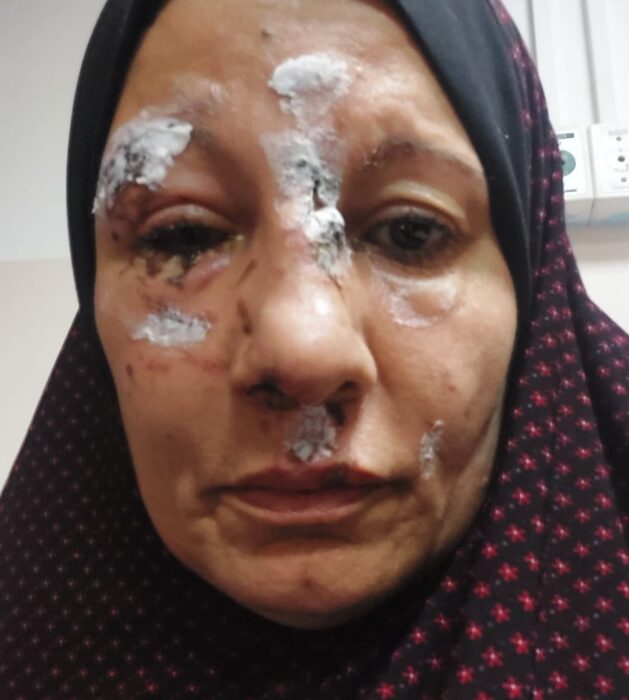
‘My mother lost everything’
The aftermath of the bombing on Waleed’s family home has forced the surviving family members into displacement, rendering them homeless and in fear for their lives.
“My mother lost everything as the head of the family. Her inherited house was bombed after the evacuation. Then they fled to our old house and were bombed inside it. It seems that it is not possible to escape from death because the bombing is everywhere.”
Waleed, originally from Ashkelon, a territory occupied by Israel in 1948, has also experienced his own share of hardship in his young life.
He was born in Jabalia, the largest of the Gaza Strip’s eight refugee camps. Located north of Gaza City, the camp covers an area of only 1.4 square kilometres but is home to over 116,000 Palestinians. Overcrowding and lack of living and social space are par for the course in the camp, with substandard conditions and 90 per cent of the water being unfit for human consumption.
Israel’s blockade on Gaza has also made life increasingly difficult for refugees, with few families being able to provide for themselves. A large proportion of the population in Jabalia camp are dependent on the United Nations Relief and Works Agency’s (UNRWA) food assistance programme to survive.
Despite all this, Waleed describes his young life, which was traumatised since childhood by war, as “normal”.
“I used to work as a waiter in a restaurant right in front of Al-Shifa Hospital. After that I started high school and I started studying for a Health and Safety Diploma with the United Nations College. After that I started working in Health and Safety,” he tells me.
“Gaza always has high unemployment, so I get a project for three months. After that I applied for another project. Usually it was me and my older brother – he now lives in Italy – we were the breadwinners, it was our job to care for the family.”
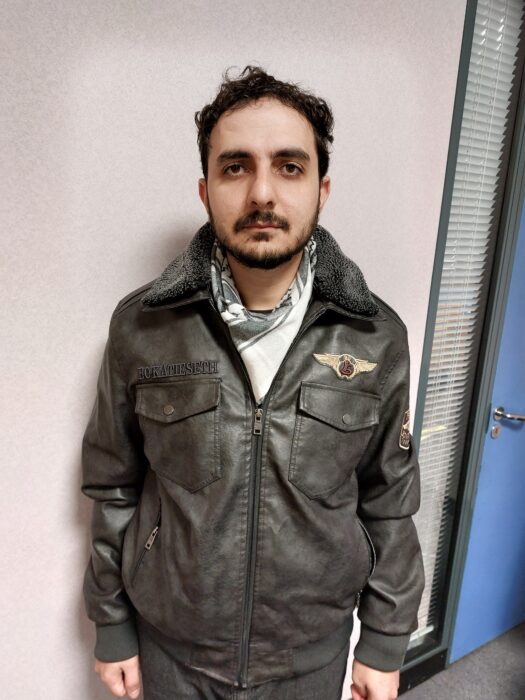
‘My first experience of war’
Waleed was a bright-eyed 13-year-old schoolboy when Israel launched a 22-day military offensive in Gaza in December 2008, leaving over 1,400 Palestinians and 13 Israelis dead after Palestianian rockets were fired on the Israeli town of Sderot, before a ceasefire was agreed.
“I lived through three wars in Gaza in my lifetime there,” he reveals.
“The first war in my life was 2008. I was 13-years-old in school. The war started at 11 o’clock in the morning and we had to wait one hour to go home. We were children and we just wanted to be with our families. When the bombing started, I will never forget it.
“There’s a street in Jabalia camp called School Street. There’s around four schools on this street, most of them for boys. The United Nations gave free education to children from six to 15 years old. When the first bomb fell, we were hiding under our tables and then we got the order to leave soon after. ‘Run, run, go home’, we were told.
“When I got my bicycle I was riding it like crazy and I remember there was a man, I think he was around 40, he was in front of me because a lot of people were running, I hit him by accident and he fell down. My brakes didn’t work very good and I was terrified. This was a real horror for me and then I had this accident and it made everything worse.
“He was a good man, he said ‘run, run, it’s alright, get home quick’. I hoped he would be okay. This was my first experience of war.
“This war went on for two months. It was very traumatic and as a child I had to regularly visit a psychologist afterwards. I was told that I have childhood trauma. After that I got more used to war.
“There was another war in 2012 which lasted 40 days and in 2014 another one again. During the war in 2021 I was here in Ireland, but I was still worried about my family.”
‘Before the war it was so beautiful’
The distraught young student wants nothing more than a better life for himself and the family he has left behind in Gaza.
As the bombing and destruction continues into its fifth month, he clings to hope, lives inside it and holds it close, constantly trying to move towards future where he and his family can live together in peace.
Sitting in the Limerick Post offices, Waleed looks ghostly with dark bags under his eyes, his gentle smile conceals the anguish that keeps him awake at night. He says he isn’t sleeping and has recurring nightmares. He finds it hard to function during the day.
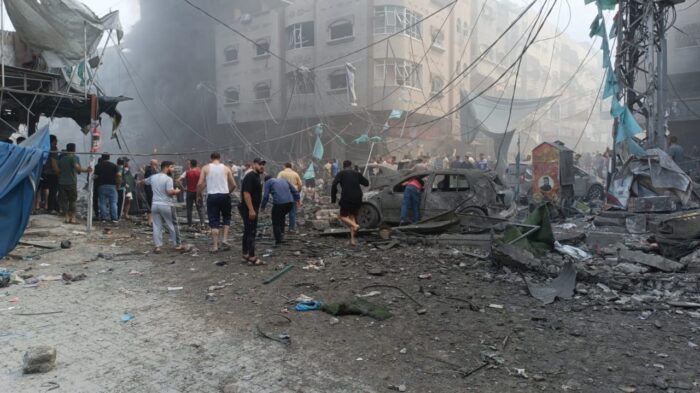
“I think too much of my family in Gaza. They are on my mind all the time. I worry about whether or not they are safe or still alive.
“Everything is gone now. Jabalia is next to the sea, before the war it was so beautiful. The buildings now are just rubble. There is nothing left. The Israelis finished bombing the north and now they are bombing the rest to make it look exactly the same as Jabalia.
“The north of Gaza is the worst place in the world and my family were suffering. They all lived in my grandmother’s house. They left their own homes because they thought my grandmother’s would be the safest. They were very close to the sea and were able to walk by the sea.
“The building my grandmother lived in is four floors and my uncle had a floor here for his family and his children. When I see it now, and all the houses are gone, I don’t recognise the place. The street where we lived does not exist anymore. The future of the area is now gone.”
Waleed says his biggest concern with the current air strikes on Gaza is that “most of those they are killing are children and, of course, half the population is made up of children. The biggest problem, in my personal opinion, is that the people are in an open air prison. There is nowhere for them to go.”
“Nobody is getting medicine to help them get better. My brother got a fragment in his leg from the blast and he was taken to the hospital. They told him they will cut off his leg. He couldn’t understand why they were going to remove it for a fragment but they said they didn’t have the tools to do anything for him. He wouldn’t let them cut the leg off and they gave him a crutch. After one week he managed to get the fragment out, which means it wasn’t very deep and he didn’t need to lose his leg.”
‘You would do the same’
Waleed now dreams of getting his family out of Gaza and has set up a GoFundMe campaign, as well as requesting humanitarian support from the Irish government, to facilitate their safe evacuation from the area.
“Is there someone somewhere who might be able to offer me advice on how I might be able to navigate the reunification or immigration process in Ireland to bring my family here to join me and to bring them to safety?” he pleads.
“My heart aches on an ongoing basis as I’m tormented by the haunting media images that show what my family and my people are enduring.”
Waleed says he is “absolutely determined to explore every avenue possible in my quest to bring my loved ones to safety. I am sure you would do the same if you were in my shoes.”
“This crisis involves attacks on civilians, the use of prohibited weapons, and the intentional targeting of non-combatants. It includes the forced displacement of Palestinian populations, especially in North Gaza.”
He describes Israeli activity in Gaza as “tantamount to genocide”.
“This situation has left us in a profound state of sorrow and despair. Necessities such as shelter, internet, fuel, water, and electricity have become extraordinarily scarce, further fuelling accusations of ethnic cleansing. Moreover, there are no functioning airports or seaports, further isolating the people in what is considered the largest open-air prison in the world. Regrettably, it has reached a point where no place is safe in Gaza anymore,” Waleed concluded.
To contribute to Waleed’s fundraising campaign to help bring his family to safety, visit gofund.me/7186e9d6.


